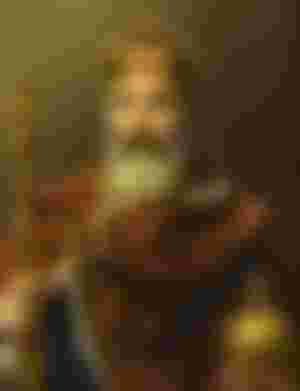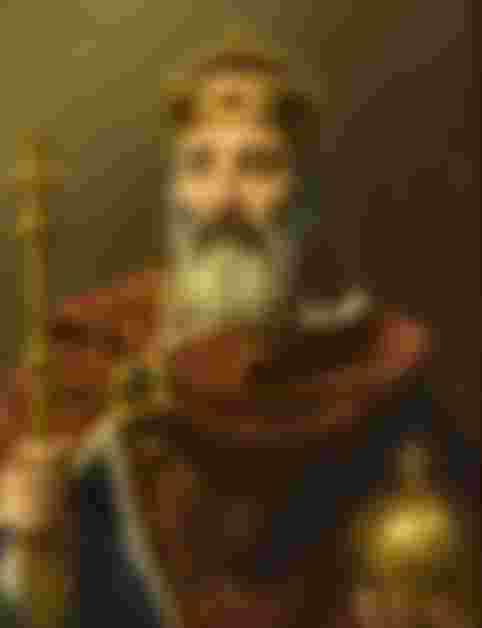
"CHARLEMAGNE" means Charles the great in French". The only thing is that they had already called him "the Great" in his lifetime. Why? For his military achievements, empire building, political skill, promotion of agriculture, construction of bridges and roads, culture and education, as well as his great interest in the clergy and the people.
Although he has been defined as "the great" by contemporary and world historians, his life was certainly not exemplary because he did not present it to young people and especially to young Christians as a model for imitation attempts. Such were his interests, his exploits and his progress, as well as his ruthless ambitions, cunning and crime.
Charlemagne was born an illegitimate son around 732 AD. His father and mother were persuaded to legalize the marriage after his birth. From 768, after the death of his father Pépin the short, Charlemagne shared the Frankish kingdom with his brother. Since 771, with the strangely sudden death of his brother, he became the sole leader of the Franks. He was crowned emperor by Pope 800 and died in 814.
Military Exploits
Charlemagne's grandfather, Charles Martel, was known as the "hammer" for his military exploits, which especially prevented the Turks from invading Europe during the Battle of Tours 732. Also Charles Martel's son, Pépin the short, he made his name through military exploits. He asked the pope to approve his accession to the Frankish throne, assuming that the throne would be better occupied by someone who has the skills than someone who has legal rights but is a weak lover of pleasure. The Catholic dignitary Bonifácio voluntarily consecrated Pépin as sovereign and was thus the first European monarch to call himself king "by the grace of God." At that time, the Frankish Empire consisted mainly of what is now France and West Germany.
Although Charlemagne was very young and worked with his brother, he forcibly suppressed an uprising in Aquitaine, in present-day southwestern France. It was the first of more than fifty campaigns he participated in. When the pope asked for help because he was threatened by Lombard's sovereign, King Desiderius, Charlemagne defeated this sovereign and used it as an excuse to annex Lombard's territory and become king of Lombardy.
However, Charlemagne's military conquests in Italy were interrupted by his need to repel the Saxons, who continued to attack Frankland. He made eighteen expeditions against her during the thirty-three years before submitting them entirely. According to the New Catholic Encyclopedia (Vol. 3, p. 497) "these wars were accompanied by extreme brutality and forced exile ... The Saxon resistance was driven by Charles' efforts to force the Saxons to accept Christianity." mockery. "Using extreme brutality" to force people to "accept Christianity"! Of course, Charlemagne was neither the first nor the last to commit crimes in the name of the "Christian" religion.
Charlemagne continued his ambition to rule a large empire and was able to add Bavaria to his kingdom through intrigue and threats of violence.This, in turn, brought him up against the Avars, a greatly feared predatory people. For centuries they were the downfall of Europe and once took 270,000 prisoners from Constantinople. The historian Lords speaks of them as barbarians who "only thought of plunder," who "were more impressive in number and devastation than in their military capacity." Their opposition to Charlemagne was so great that he almost destroyed them when he conquered them.
His only major military setback was the return of an expedition to Spain. At Roncesvalles, the Gascons attacked, exterminated 20,000 of his soldiers and fled with the looting that Charlemagne had taken.
As a result of the military expeditions and his political team, Charlemagne was able to extend Frankland's rule to most of what is now France, West Germany, Austria, and Switzerland. Polland, Belgium, part of Spain and a good half of Italy. We can say that success crowned his territorial ambitions at the expense of his scruples. But does success alone give a leader the right to be called "great"?
His political sense
Charlemagne is said to have changed Europe not only externally through his conquests, but also internally through his state art. He refined and drafted the laws and issued a "massive flow" of ordinances called "capitulars." Not satisfied with this, he also sent agents, the missi, in pairs, to check on the men he had placed in positions of power in his various fields. Usually one was a secular officer, the other a religious officer. They listened to complaints and corrected things, because, as he said, "the emperor cannot exercise the necessary care and discipline with each one."
He also repaired and built roads and bridges, fostered better agricultural methods, and resettled people for the good of his kingdom. He established a uniform system of weights and measures and replaced the sixty-seven different types of locally minted coins with one for the entire kingdom; again, a masterstroke in terms of profits for him and his government. His system of 240 to 1 (pence, shillings and pounds) was adopted by a king of England; a system that the British recently remodeled. Much wiser were France and Germany, who long ago abandoned Charlemagne's 240-to-1 system for the decimal system.
Cultural Interest
Charlemagne was described as "a man of insatiable intellectual curiosity, with many facets of interests and demanding of those with whom to learn." All of this can be seen as another aspect of
selfish ambition. He convinced the Anglo-Saxon Alcuin, one of the wisest men of his time, to come to his court to "plant the seeds of knowledge in Frankland." Many others from various countries were also drawn to Charlemagne to reside in his royal domains. He ordered priests to open schools in all cities and towns, where parents could send their children free of charge, unless they felt obligated and could pay for their children's education. That is why, until very recently, the children of France had a day reserved for this "inventor of the school", or "San Carlo Magno".
He was also very interested in art, culminating in the "Carolingian Renaissance", as it is called.
The style of lettering used by most Western countries today has been developed by example. It is commonly referred to as the "Roman" or "Latin" font as opposed to the ancient Gothic or German ornamental type. Charlemagne's educational efforts paid off so much that, years later, King Alfred of England sent scholars from the Franks to help re-educate his country. As one French scholar put it: "Charlemagne laid the foundation for all modern education."
His Religiosity
It can be said that Charlemagne, in his religiosity, resembled the religious leaders of Jesus' time who actually said, "Do what I say, not what I do.He believed he had a divine commission to establish the kingdom of God on earth, but he used cunning, intrigue and extreme brutality. Each of his important projects has had a religious significance. He destroyed the pagan idols and the forests of the Saxons and gave them the opportunity to be baptized or killed. However, at the end of his reign, Alcuin managed to persuade him that forced baptisms are meaningless, since a man can be forced to be baptized, but not to believe. While professing his friendship with the popes and, on several occasions, came to their aid in the face of the threat of the military forces, a historian tells us that "the result of his policy has always seemed like a slap to the Pope."
In some religious matters, he was superior to the popes and bishops, and felt free to warn them about doctrine, morals, and the fulfillment of their duties.Among the many councils or meetings of the clergy that he convened, there was one to condemn the teaching that Jesus was the adopted Son rather than the Son of God and to condemn the worship of images, while granting the freedom to worship them. . When the pope protested, Charlemagne did not give an inch.
He knew the Bible well and liked to quote it to back up his measures. He showed interest in examining it with the help of his researcher Alcuino, whose work Charlemagne exclaimed: “God, we have helped ourselves in everything, we have already received a careful correction of all the books of the Old and New Testaments. ., which the copies in their ignorance damaged. Although his personal life did not meet God's righteous requirements, he warned his subjects that his salvation was due to his behavior, since God would hold him accountable for his actions.
As for his role as crowned emperor by Pope Leo III on December 25, 800, there is a great difference of opinion among history students. Many claim that he knew everything and was very supportive. But others clung to his personal biographer Einhart, who said that if Charlemagne knew in advance what the pope intended to do, he would not have entered the cathedral that day. Einhart's statement emphasizes claims that "the old emperor took a course ... indicating that the imperial title did not mean much news in terms of the internal administration of the kingdom. At times, actual actions seemed to contradict the whole idea of an empire. .. 813, after killing two of his sons, he personally crowned Louis (the pious) as his successor, thus excluding the papacy from all participation in the election or possession of the emperor. "New Catholic Encyclopedia, vol. 3, p. 499.
How Great?
In fact, very few men were called "the great ones" during his lifetime, as was Charlemagne by many of his contemporaries. But not everyone agreed. His cruelty in realizing his ambitions created more than one conspiracy to kill himself, and one of them, which involved his firstborn son (whom Charlemagne despised for being fierce), almost succeeded.God's and human’s laws regarding human life and the sanctity of blood meant nothing to Charles Deagne. He no doubt went on to say, "The end justifies the means." More than that, when he preached morality to others, from the pope to rank and file, especially to priestesses and monks who in his time were known for their sexual immorality, but he himself had lovers and concubines. As one of his cinematographers put it, his government was "watching murder, purges and looting go hand in hand with reform, enlightenment and the unification of [parts] of Europe." He also counted on his unscrupulous plans that he acquired Bayern and defeated Avars. He was even willing to marry the murderous Empress Irene to join the Byzantine Empire with his own.
Historians generally regard the beheading of 4,500 Saxon prisoners in one day because of their involvement in an uprising as "the most heinous task in their lives." And although he always expressed his concern about how he would act in God's hands, there is no trace of his remorse for this bloody act. He perceived it as a lesson for the Saxons, who were still rebelling against him. But the plot was useless, because instead of instilling fear in the Saxons, it made them even more rebellious! In his religious vanity, he wanted to be known as "King David", but he could not point to any divine commandments for his wars as King David would. In addition, King David expressed his deep sorrow and remorse when he transgressed.
And it must also be acknowledged that the unity of his empire was mainly due to his strong personality. He did not build well,for “the political structure that Charlemagne had created disintegrated. . . shortly after his death, says his biographer Winston.
